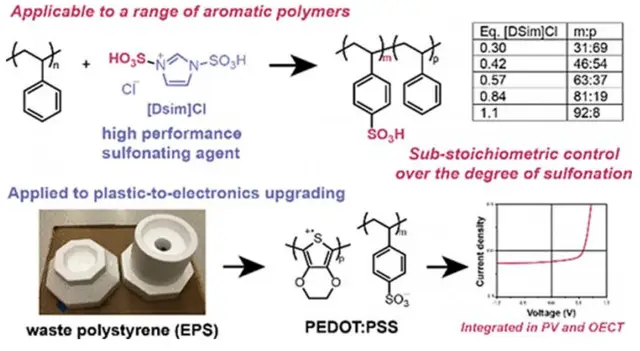Scientists from the United States have discovered a chemical reaction that can transform waste plastic, namely polystyrene foam, in the valuable conductive polymer PEDOT:PSS. This polymer shows comparable performance to commercially available counterparts when used in organic electronic transistors and solar panels.
Researchers at the University of Delaware and Argonne National Laboratory have developed a method to synthesize PEDOT:PSS by sulfonating polystyrene, a synthetic plastic widely used in a variety of disposable containers and packaging materials. According to EurekAlert, the study, published in the journal JACS Au, demonstrates the successful integration of recycled plastic waste into fully functional electronic devices, including hybrid silicon solar cells and organic electrochemical transistors (OETs).
Sulfonation is a common chemical reaction in which a hydrogen atom is replaced by a sulfonic acid. This process is part of the technology for the production of dyes, drugs and ion exchange resins (ion exchangers), which are synthetic polymers. Chemical reactions can be either “hard“ (with higher final efficiency but requiring corrosive reagents) or “soft“ (less effective but using milder reagents). The scientists want to find something in the middle: “We needed a reagent that was effective enough to achieve a really high degree of functionalization, but which would not break the polymer chain,” explains the leader of the study, Laura Kaiser.

The key achievement, however, is the development of a method for “soft“ sulfonation, which provides a high degree of functionalization of the polymer without destroying its chain. Dr. Kelsey Koutsoukos noted that the team conducted months of experiments to find the optimal reaction conditions. “We tested different organic solvents, different molar ratios of the sulfonating agent, evaluated different temperatures and times to see which conditions were best for achieving a high degree of sulfonation,” he said.
Ultimately, it becomes possible to find reaction conditions that result in high sulfonation of the polymer, minimal defects, and high efficiency, all using a mild sulfonating agent. The ability to precisely control the rate of the entire process was also discovered, which opens up prospects for applications in various fields, including fuel cells and water filtration devices.
The researchers emphasize that their work could significantly contribute to global sustainability efforts by offering a new way to recycle waste into valuable materials. One of the main authors of the work, Chun Yan Lo, notes: “Many scientists are working on the problem of recycling used raw materials, but our study is a different example of how this problem can be solved.“ The waste-derived polymer was compared with commercially available PEDOT:PSS. The function of both types is absolutely identical.
